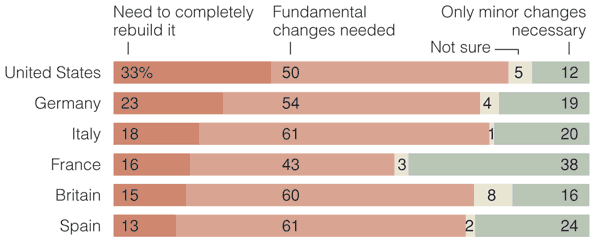4 of 5 Americans Hate Health System
Ezra Klein snarks, “It’s weird how the country with the best health care in the world — America, or so I’m told — also has the highest percentage of its population telling pollsters that the system is totally screwed up and needs a complete overhaul. Ha! America is so charmingly wacky!”
Here is the breakdown, from a new Harris Interactive/International Herald Tribune poll:

The relative satisfaction rates are similar across the board but Americans were more likely to pick “rebuild” than “fundamentally change” to voice their complaints. One wonders how much these results reflect relative American crankiness rather than the system itself.
Indeed, given the politics involved — we’ve got a polarized electorate, roughly half of whom are likely to vote for the party who’s banging the “fundamental changes needed” drum — it’s astounding that American satisfaction levels are so close to those in Germany, Italy, Spain, and the UK. Only the French seem to be markedly more satisfied than we are.
For that matter, given that we now have a relatively privatized system and are therefore constantly battling over how much more government involvement is needed whereas the others are all in a choice-free zone, it’s almost certain that the issue is more on the minds of average Americans.
This is especially true given that we have a sizable number of Americans who are uninsured and have to rely on emergent care or go into serious debt to get medical care whereas the Europeans all have more equitable, universal systems. To be sure, a greater percentage of Americans, because of excellent insurance and the easier availability of the most expensive technology and treatment options, have access to extraordinarily good care than their European counterparts. But this also creates a sense of relative deprivation that’s unlikely to exist under those systems.






After 20 years of constantly being told by liberals and the press (But I repeat myself) that the system we have stinks, what the hell does Klein expect?
By what standard? While I have no doubt that the US has the finest medical technology, medical schools and so on, that is not the only standard that matters.
Its hard to get around the fact that millions of people in this country have no health insurance. They are forced to go to ERs for non-critical care, which impacts costs and quality of care in a negative manner for everyone.
Companies that provide health insurance are in business to make a profit, not to provide health care. How much higher would the quality and availability of health care be in this country if we could take those billions in profit and actually spend them on health care?
And don’t get me started on medical billing. I have more problems with bills from our local health care group than with everyone else I do business with put together. They once sent me to collection on a bill that I had in fact overpaid. After many hours of battling on the phone to get it straightened out, they reimbursed me the $900 I had overpaid.
Don’t forget about us Americans who have insurance, but go into serious medical debt anyway.
Can you find a better motive for proving health insurance than making a profit?
Why not remove profit from the equation?
Because without profit you have no other reliable motive to get people to do the things that need to be done.
Is Tricare for profit?
James, I would like to see some quantitative data to support this, rather than anecdotal inference. Yes, it’s true I don’t have to wait a year to get a hip replacement, but how about the normal prevantative stuff?
American healthcare is “privatized,” but that’s not the same as it being a “free market.” Regardless, one of the biggest problems we have is the idea that health insurance is a “right.” This is ridiculous- health insurance is, by its very nature, an irrational proposition. As with all forms of insurance, the average person gets less out of it than they put in. This is fine when insurance is just used as a way of protecting against catastrophic loss; but when it’s used as a way of paying for regular expenses, it winds up being a tremendous waste of money.
This would be true whether run by the government or run by a private company. Even though the private company has its profits, the government would almost certainly have higher administrative costs since no one does bureaucracy like the government!
In any event, I happen to be an American who thinks that our healthcare system is fundamentally flawed and needs to be revamped. But the way I would revamp it is to make it more market-oriented, not less.
Ah, you mean health care for the healthy and the wealthy, and best of luck to everyone else…
Are your fire and police services in the hands of private companies? Or your army? There are arguments both ways about private and public healthcare, but I don’t think this is a good one.
No, Tricare is motivated by government directive, not profits. You can replace out entire health insurance system with one driven by government directive, but that still wouldn’t increase the motive for quality or cheap health insurance.
The real irony hasn’t been mentioned yet: the large number of American physicians (who have incomes three times or more their European counterparts and are easily the highest-compensated in the world) who are unhappy with their jobs.
I would be curious to see what people who participate in the Tricare system think of the quality of care and the level of administrative issues they have to deal with…
We do have government-funded public health services for emergencies, which would be the health care equivalent of police and fire departments. We don’t have government funding of sprinkler systems or mall cops though.
If we could afford to pay for typical health care out-of-pocket, then the government could probably be an effective solution for handling emergencies. As it is, even minor health care service will quickly get beyond the means of 90% of the population to pay for out-of-pocket.
Imagine if you had to have car insurance to be able to afford to have an oil change or rotate your tires. Now imagine that the government was obligated to pay for a transmission or engine rebuild for anyone who didn’t have car insurance. The insurance would become so costly that a majority of people would rather drive their car until is breaks, and the government will pay to fix it, than seek pre-emptive maintenance.
Since Tricare was designed to allow people to use commercial medical facilities, their quality of care would likely be the same as anyone else using those specific facilities. Unless Tricare pays like Medicare, in which case they probably get the same sub-standard quality as Medicare recipients.
No, but they aren’t exactly under Federal Control either. Anjin-san’s hostility to free will and free choices by a free people in favor of a deterministic federal government solution to every problem remains a source of constant amusement, though perhaps not as amusing as his belief that government is virtuous and all non-government for profit entities aren’t.
But seriously, there is some confusion created by conflating health care (a good) with health insurance (a medium for acquiring the good). They are not the same thing. Giving everyone health insurance maysolve some access and cost problems, but it is not a panacea nor does it necessarily do anything to improve the quality of healthcare.
As I had to take a trip to the emergency room last week, I find it hard to believe that you can get better healthcare anywhere else in the world. Perhaps as good, but not better. And I believe that anyone who showed up at the hospital emergency room as I did with similar symptoms would have got the same healthcare services regardless of the adequacy, inadequacy, or non-existence of their health insurance.
Perhaps the billions in profits the insurers are currently making could go towards making sure payments are sufficient for higher quality care.
What a bucket of crap. When I was younger, I had complete confidence in the ability of the free market to solve our health care problems. Now I am older, wiser and have seen a bit more.
I was offered a very good contract position last year, which I took. This meant having to shop for health insurance, something I had not done in many years. I was unable to get any individual HMO coverage, as I have high blood pressure & cholesterol (as did my grandmother, who lived to be 98). I am a vegetarian who does not smoke, drink or have a weight problem. I work out. I have never had a serious illness. Yet I had enough trouble getting coverage that I had to have my wife get an exemption from her job so that I could get coverage.
Even though my wife and I enjoy generally excellent health, our medical expenses with insurance, co pays, and so on have put a serious dent in our budget.
So if two healthy people with a household income of 150k+ a year are getting strained, how are people who are not healthy and have lower incomes making out? Not well, I imagine. How are they doing with “free choices”?
Sure, but then the insurers wouldn’t be making the profits, and so would have to either stop paying employees, stop paying shareholders, increase premiums, deny services or all of the above.
Being in exactly that situation (plus 2 kids), I can verify that “Not well” is an understatement.
Healthcare was 16% of GDP last time I looked, so presumably your annual health care costs are in the $24K range if you are “average.”
So, how exactly are we to provide free healthcare for everyone when you say it is a burden for you when you’re making $150K a year? TANSTAAFL still holds. Would you feel better about paying $36K a year for health care as long as it was called taxes and distributed by a bureaucracy? Well, at least until the Canadian or UK type rationing kicked in?
Man, oh man are you going to enjoy Obamaland where the threshold for rich is apparently $75K in income.
When did anyone mention “free” health care? That is simply a red herring raised by the right to cloud the issue. I expect to pay for health care, the same as I pay for any other good or service.
Larry Glasscock, CEO of Wellpoint, the parent company of my insurer, made 46.2 million dollars last year. Yet a significant portion of our population has no insurance, and another large % is struggling to keep up with health care costs (which are up over %100 under Mr. Bush). Clearly, this is out of whack.
I think the greatest country in the world can provide quality health care that people can afford. I think we can get everyone to the doctor once a year.
It saddens me that so many people like Charles are members of the “America can’t get it done, its too hard” club.
Removing profit from a system is the best way to ensure it’s fouled up.
Fixed that for you.
“Mr. Smith, I sorry to tell you that you have cancer. Hang tight while we figure out how we can make a few bucks off of you.”
Is that really the American dream?
James, how you manage to pretend the data on France doesn’t exist or is meaningless is beyond me.
The best country in the survey in satisfaction is a public healthcare system. The fact that some countries have bad public healthcare systems is irrelevant when the conservative case – including *yours* is that a public health care system is *inherently* worse than a less public system. This data slaps that argument down, and hard. And you breezily ignore it.
I think your readers would be well served to hear an explanation for the France vs. US contrast that is other than “France’s public health care system delivers better service than our more privatized system”. From you.
Or else an admission that this is an accurate statement.
Well we have, by far, the finest military in the world. Are they for profit?
(oh yea, and don’t they have … whisper it … socialized medicine?)
This post is an examination of a specific survey, not a comprehensive look at the public vs. private debate.
Yes, people in France — only only France — seem to be significantly more satisfied than Americans. But the point of the post is that there can be many explanations for that other than “France’s public health care system delivers better service than our more privatized system.”
My sense, by the way, is that that probably is true in aggregate. Fewer people are left uncovered and it’s cheaper to run, although at some pretty big tradeoffs for those who would otherwise be getting better care under a system like ours.
Um, yeah, largely it is. There are other motives of course, patriotism, career advancement, politics. Which is why I replaced “profit” with “motive” in Bit’s comment.
But the point of the post is that there can be many explanations for that other than “France’s public health care system delivers better service than our more privatized system.”
I was going to respond with something like “Okay, what reasons would those be”, but on a second reading I see you’ve included one, namely, “The American media talks about health care more.”
I’m not really convinced that this accounts for the very large difference here, but I technically, I suppose you’ve provided an alternate explanation.
We don’t even actually know if the US media does, in fact, talk about health care more; it’s a speculation.
On the other hand, though, I suppose I was mistaken in assuming your views on the topic at large. I stand corrected.
although at some pretty big tradeoffs for those who would otherwise be getting better care under a system like ours.
I don’t see why the care of the affluent (which must be who you mean) would deteriorate as long as private hospitals and supplemntal private insurance were still tolerated.
Perhaps there are complicated reasons relating to the changing shape of the overall market. I haven’t yet heard an argument along those lines that I found convincing. People tend to assume that a public healthcare system prohibits private health care, but most public systems don’t, and I for one don’t favor such a prohibition in America.
anjin-san,
Why are you determined to put George Bush in charge of your healthcare?
For people talking about the ‘motives’ of a system…the health insurance industry has absolutely no motive to provide health care, as they not only don’t get paid to provide health care, they make money when they don’t provide it.
You want to know why our health care system is so screwed up, it’s because we’ve built a system in front of it that everyone goes through to get health care, which has an incentive to provide as little health care as possible.
It’s like a nightclub that outsources their doorman to a different company, one that gets paid a flat fee to operate the door, but then has to pay the cover charge of each person that enters. Gee, I wonder why so many people have trouble getting past the doorman into the nightclub? I wonder why so many customers are breaking in though the bathroom window? I wonder why the nightclub appears to be failing?
The health insurance industry needs to go, period. It does not need to exist in any way, shape, or form. The entire purpose and motive of it is to deny health care.
Now, people are thinking ‘But we have other insurance industries, and they work’. Well, yes, but unlike other insurance a) everyone needs health care, and b) health insurance companies have managed to pretend health care needs are subjective, and c) other insurance companies don’t have near total control of the industry they’re in front of.
I.e, if you have fire insurance on your house, and your house burns down, the insurance company must pay unless they can prove it was arson or something not covered. If stuff from your house was stolen, renters insurance doesn’t get to argue that you had a faulty window that you should have reported when you bought the insurance, so they could have denied it. Auto repair shops don’t charge three times as much for repairing cars normally because comprehensive car insurance repairs have forced those prices through the floor, and half the other people drive off without paying, and repair shops must go along with this because insurance referrals are 90% of their business.
Other insurance companies are regulated, and rare, and a choice instead of a necessity, and don’t take effect for routine things but for disasters. Health insurance takes the idea of insurance and turns it into a nationwide scam forcing hospitals out of business and people out on the street, because they’re positioned themselves as doormen to a place they don’t want people getting to.
Sadly, it appears that all politicians are in bed with the health insurance industry, and try to include it as part of any reform, when any objective observe would conclude it shouldn’t exist at all.